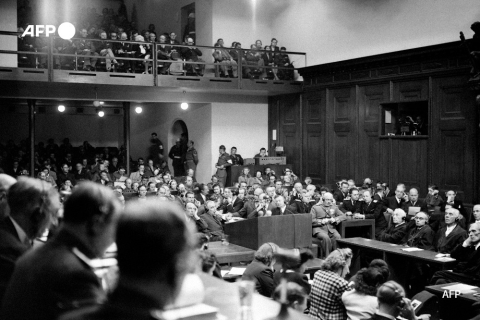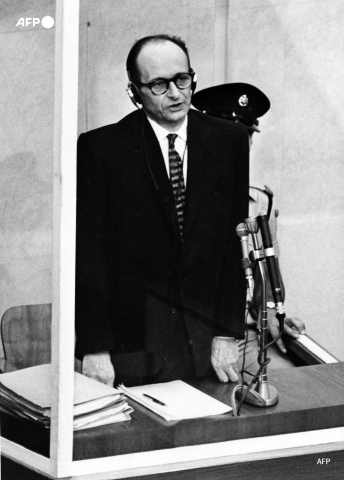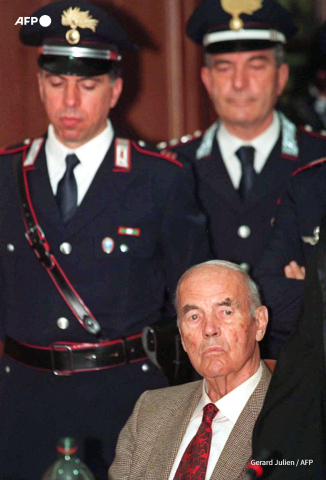Nuremberg : The first of many post WWII war crimes trials
The Nuremberg trial was just the first in a series of judicial proceedings created to try war criminals in the wake of World War II.
Here is an overview of others from Germany to the Soviet Union and Japan that shone spotlights on WWII atrocities and laid the foundations for the international legal system.
- Prosecuting Nazi war criminals in Germany -

- In 1946 and 1949 the second of twelve trials at Nuremberg sees 177 doctors, lawyers, soldiers and industrialists who had taken part in the German Nazi regime put in the dock. Twenty four are executed, 118 given jail sentences, of which 20 are for life, and 35 are acquitted.
- In 1965, 22 officials from the Auschwitz death camp are convicted by a court in Frankfurt, southwestern Germany. Among them is Robert Mulka, deputy of Rudolf Hess, the camp's SS commander.
- In 1992, another German court in Stuttgart convicts Josef Schwammberger, a forced-labour camp commander near Krakow, in Poland, to life in prison for the murder and being an accessory to the murder of Jewish detainees.
German officials continue to prosecute some SS members for warcrimes, but a justice ministry study released in October 2016 said that in 1957, fully 77 percent of senior ministry officals were former Nazi party members who protected former comrades.
"The Nazi-era lawyers went on to cover up old injustice rather than to uncover it and thereby created new injustice," Justice Minister Heiko Maas said.
- International Nazi war crimes trials -

- In April 1961, Adolf Eichmann, one of the main perpetrators of the "Final Solution" aimed at wiping out Jews, is tried by an Israeli court after being abducted in Buenos Aires. He is hanged on May 31, 1962 at Ramleh prison near Tel Aviv.
- In 1987, German Klaus Barbie, chief of the Gestapo in the French city of Lyon, is sentenced by a French court to life in prison for crimes against humanity, notably for the 1944 deportation of 44 Jewish children.
- A year later, John Ivan Demjanjuk is hauled before a court in Jerusalem and accused of being "Ivan the Terrible," an infamous Ukrainian guard at the Treblinka death camp in Poland.
Found guilty of all charges and sentenced to death in 1988, he is freed five years later when evidence surfaces suggesting Israel has the wrong man. He is tried again in 2009 in Germany and sentenced to five years in prison.
- Japan's Nuremberg -
The Tokyo trials are Asia's version of Nuremberg, during which Japanese war criminals are tried from May 3, 1946 to November 12, 1948.
Comprised of 11 judges from allied countries, the trials, which concern World War II atrocities in occupied countries from China to the Philippines and Singapore, put 28 people in the dock, including four former prime ministers and three former foreign ministers.
After trials lasting two and a half years, 25 of the accused are found guilty, two having died during the trial and one being committed to an institution for mental problems.
Seven defendants are sentenced to death and executed on December 23, 1948, while 16 are sentenced to life in prison, one to twenty years and one to seven years.
Many top Japanese officials escape judgement however, in particular Emperor Hirohito, because the United States, which occupies Japan after the war, is wary of destabilising the country.
- Low profile Soviet trials -
A series of low-profile trials take place in the Soviet Union, notably in 1988 when a Nazi collaborator who joined the SS, Alexander Possevin, is accused of participating in the massacre of civilians in Ukraine, found guilty, sentenced to death and executed.

- Prosecuting an Italian massacre -
- In 1998, former SS officer Erich Priebke is sentenced to life in prison by an Italian court for his role in the massacre of 335 people -- almost all civilians -- in the Ardeatine complex of caves near Rome in 1944. In view of his age, 85, the sentence is commuted to house arrest, and he dies at his home in 2013.
- In 1999, Croat Dinko Sakic, former commander of the Croatian concentration camp at Jasenovac, is sentenced to 20 years in prison for war crimes and crimes against humanity by a court in Zagreb.
- In 2011, Hungarian Sandor Kepiro, 97 and then at the top of a list of Nazi war criminals published by the Simon Wiesenthal centre, is found not guilty of complicity in 1942 Serbian war crimes by a court in Budapest.
